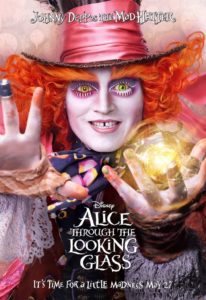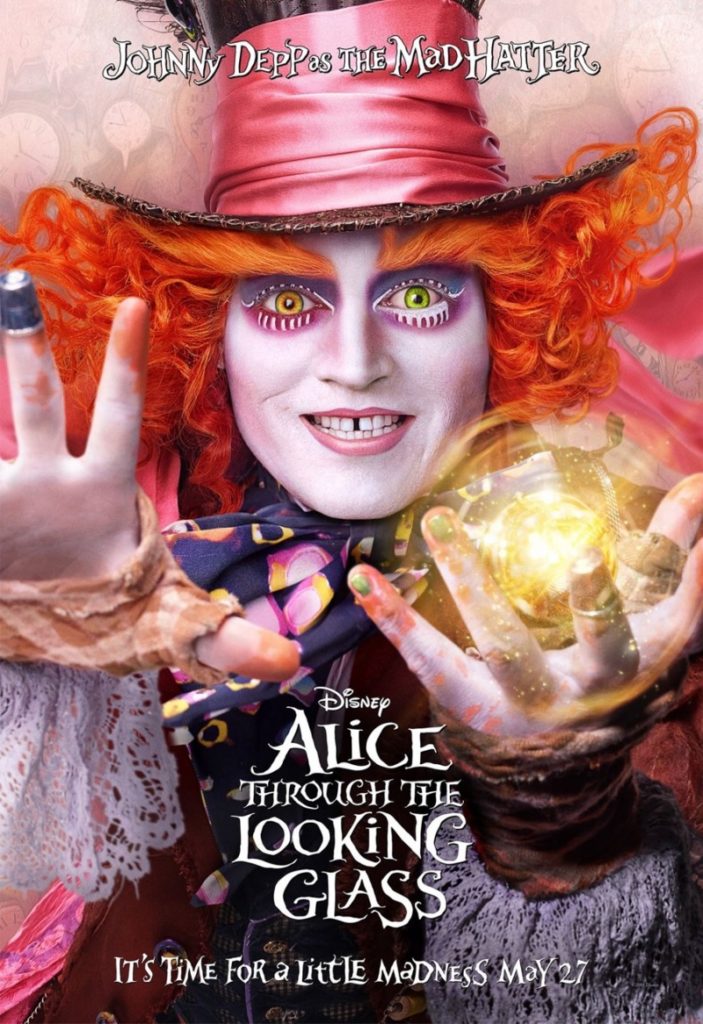We’re All Mad Here
The latest m ovie from Wonderland, Alice Through the Looking Glass, just came out on DVD. I haven’t seen it yet, but I did see, and moderately enjoyed, the Tim Burton-directed first installment, Alice in Wonderland. Of course, nothing will ever compare to the epic mindtrip experience of the classic Disney cartoon. I loved Lewis Carroll’s fantastic books (and used to be able to recite the Jabberwocky poem from memory. I remember my excitement at realizing, after the seventh or eighth viewing of the cartoon, that the Cheshire cat was reciting this poem throughout the film).
ovie from Wonderland, Alice Through the Looking Glass, just came out on DVD. I haven’t seen it yet, but I did see, and moderately enjoyed, the Tim Burton-directed first installment, Alice in Wonderland. Of course, nothing will ever compare to the epic mindtrip experience of the classic Disney cartoon. I loved Lewis Carroll’s fantastic books (and used to be able to recite the Jabberwocky poem from memory. I remember my excitement at realizing, after the seventh or eighth viewing of the cartoon, that the Cheshire cat was reciting this poem throughout the film).
Alice is certainly the central character in the books and movies, but the more recent film adaptations focus quite a bit on Johnny Depp’s Mad Hatter character. His take on this iconic character is quite memorable, as much for his abnormally large eyes as for his “madness.” This got me thinking: why did the film producers emphasize this character? Perhaps because it was one of the few humans in the story, and Johnny Depp dressed up as the Cheshire Cat might have come across more like Mike Meyers in The Cat in the Hat. Or perhaps it was because his “mad” character embodies what many people wish for: to be functional yet blissfully insane.
I don’t have much personal experience with mental illness, but there doesn’t seem to be anything enjoyable about true insanity. What is commonly portrayed in movies is usually far from the real thing. Movies like A Clockwork Orange or Fight Club give mental illness a punk rock edge that makes it almost fun in a way. The schedules and pressures of our technology-heavy, artificially busy modern lives takes its toll, and the movie version of madness can seem like a much-needed vacation. Characters like the Joker and Harley Quinn are also getting quite a lot of attention these days, and their particular flavor of madness is portrayed as destructive yet still whimsical and joyful, even cute in a way.
True insanity is a disease. There is nothing fun or desirable about it, and there are many other mental illnesses that are unfairly or incorrectly portrayed in entertainment. Exceptions do exist, of course, but serial killers are rarely charming, multiple personalities are rarely witty and sociable, and hallucinations rarely lead to anarchistic revolution. Mental disorders are often romanticized or softened or augmented with “extra ingredients.” There’s nothing inherently wrong about this, but like everything in the entertainment world, it should hardly be taken as a reflection of reality.
The Christian church does not have a good track record of dealing with mental illness, and this is also evident in Christian fiction. Issues like depression and schizophrenia do pop up now and then, along with more sensational disorders, but as with most uncomfortable topics, they are often minimized in Christian fiction. I would encourage you to drop by The Crossover Alliance blog for an excellent article and discussion about this very issue.
It would be nice if madness were confined only to Wonderland, but that isn’t the case. And since mental illness is such a real part of our world, it should be a real part of our stories as well.







































No surprise that I 100% agree with this–so much that I’m working on a series where all of the characters suffer from some kind of neurological condition or mental disorder. People really need to see that 1.) this doesn’t necessarily make someone an untouchable, 2.) it doesn’t necessarily make someone a saint or espeically sympathetic (at all) 3.) it’s not a superpower or perk, although coping mechanisms that develop from it can occasionally appear that way. Thanks for posting!
Yes – they are either softened/romanticized or the opposite. There’s so much misinformation out there. I’ve recently been watching the tv show Parenthood solely because I heard there was a character with aspergers and that they had gone out of their way to try to portray it realistically. Learning disorders are something else not portrayed often enough.
Isn’t being charming one of the ways the serial killers lure in their victims? (I’m talking psychopaths, not sociopaths.)
I think the best portrayal I’ve seen was Kaladin from The Way of Kings. He deals with depression, and the author made it part of his character without making it too much of his character.